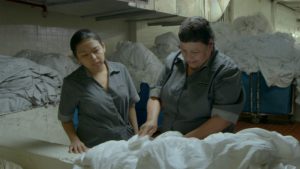Three generations of a Mexican family share a large house. The grandmother succumbed to cancer a few years earlier. The father speaks with robotic voice through an electronic device, a tracheostomy revealing that he has been afflicted by a horrible disease (perhaps also cancer?). Their daughter Nuri has a small child, and so does their son Tano (Mateo García Elizondo). Tragically, he suffers from the same horrific disease as his mother. He has rejected chemotherapy and instead decided to mitigate his suffering with morphine, in what looks like a palliative care practice.
Lila Avilés’s second feature film, after the much-acclaimed The Chambermaid (2018), deep dives into the lives of a family preparing for an impeding loss. The film is partly autobiographical: the 41-year-old director had to come to terms with a tragically premature death in her own family. Tano’s seven-year-old daughter Sol (Naíma Sentíes) is a stand-in for the director’s own child, and the film is told mostly from her perspective. Her mother is the doting Lucia (Iazua Larios). She has two aunties, Nuri (Montserrat Maranon) and Alejandra (Marisol Gasé), and a female cousin of around her same age. This is a movie dominated by strong females, with vulnerable males forced to face their mortality. A dog, a cat and a parrot quietly observe as the boisterous humans interact. A large bird flies over grandpa’s head as he prunes a bonsai for his dying son. Animals and plants play a significant role, connecting human beings with the environment around them.
Viewers are immediately pushed into the intimacy of the family. The gently shaky handheld camera is rarely more than a metre away from the characters, and abundant close-ups reassure that we become quickly acquainted with Sol’s relatives. The intimacy is such that the film opens with two characters literally on the toilet seat. We are invited to mingle with them on the WC, in the shower, in the kitchen, in the garden, etc. We also witness as they have to come to terms with their physical limitations. Tano does not want to leave his room in order to celebrate his birthday in the garden (presumably his last one). He has to promptly return once he attempts to budge: “I just shat myself”. His suffering is palpable, quite literally. Totem offers viewers an emotional, a physical and even a physiological connection with its characters. At times, the sensation is uncomfortable. As a whole, the experience is extremely sobering.
Most of the sequences are very short, often under a minute. The fast editing makes the narrative fractious, just like the mind of a child attempting to put together the puzzle pieces of the traumatic developments around her. The child actors are outstanding. I would hazard a guess that such authenticity was achieved through a very organic and spontaneous script. The outcome is a credible and riveting story of death seen through the eyes of a young girl. Totem shares this topic and these characteristics with equally impressive Spanish drama Summer 93 (Carla Simon, 2018).
Despite its gloomy subject matter, Totem is a film teeming with hope. It is beautiful and soothing to watch the members of the family do their best in order to mitigate Tano’s suffering, and to provide him with little moments of laughter and joy. Their efforts climax during the birthday party, when relatives and friends perform a myriad of antics in order to cheer him up. Despite their latin temperament, nobody ever cries. Everyone seems to understand that it is their collective duty to remain strong and positive at such difficult times.
There are also hilarious moments, particularly when Sol does what she knows best: being a child. She sticks snails on the wall paintings, plays with grandpa’s artificial voice machine, and clenches herself to her mother’s leg in order to prevent the woman from leaving. A middle-aged spiritist is hired to rid the house from evil forces. She delivers some of the film’s most hilarious moments: “The bad spirits are so strong that I will have to charge you 2,500 pesos and then rest for three days. By the way, I also sell Tupperware”. The family remain open to any possibility of absolution from their suffering, however frivolous and absurd. Maybe a miracle could happen. Meanwhile, they just smile and carry on with their lives as usual.
Totem premiered in the 73rd Berlinale, when this piece was originally written. It was part of the event’s Official Competition, and this writer’s favourite film thus far to win the event’s top prize (a desire not fulfilled). It premieres in the UK in October as part of the BFI London Film Festival. In UK cinemas on Friday, December 1st. On various VoD platforms on Tuesday, January 2nd (2024).










